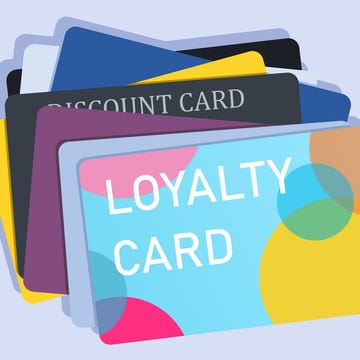What started as a single day of discounts has grown into a week-long spending extravaganza and British shoppers love it!
Black Friday is the perfect chance to tick off a large chunk of our Christmas shopping list at bargain prices - and get those big home purchases like tech, appliances and furnishings that are hard to justify at full price. Online sales alone this year are expected to reach nearly £2 billion, according to Statistica.
But the problem is scammers love Black Friday, too. The huge frenzy in online transactions provides the perfect cover for increasingly sophisticated scams, often AI generated, designed to trick bargain hunters and harvest financial data.
Shoppers lost over £11 million to cyber criminals during the last festive shopping period (November 2023- Jan 2024), almost a million more than the previous year, with clothing, high-end tech products and cars among the most common products cited. Each victim lost £695 on average.
"Unfortunately, this is prime time for cyber criminals, who exploit bargain hunters with increasingly sophisticated scams – sometimes crafted using AI – making them harder to detect," says Richard Horne, CEO, National Cyber Security Centre (NCSC).
8 ways to protect yourself from Black Friday scammers
Even the most savvy among us are vulnerable to scams, so it's important to keep your wits about you, especially at this busy shopping time. Use our essential tips to help protect your money and your personal data.
1.Social media smoke and mirrors
Our social media feeds have been awash with Black Friday bargain deals for weeks but not all of these will be legit. The new figures reveal that 43% of fraud incidents reported to Action Fraud mentioned a social media platform, and nearly 19% an online marketplaces.
If a retailer you’ve never heard of before pops up in your feed, do a simple google search [company name] and [scams] and check of reviews on TrustPilot and Feefo should flag any potential issues.
Even if the company seems genuine, be on the look out for comments about delivery times, quality of products or non-arrival of goods. "Never feel pressured into buying anything online - creating a false sense of urgency is a tell-tale sign of a fraudster. Whether you are shopping on online marketplaces, social media or retailers, avoid bank transfers if you can, and use a credit card as it can provide more protection if anything goes wrong," says Adam Mercer , deputy head of Action Fraud.
2. Promo newsletters galore!
Chances are, your inbox is flooded with bargain Black Friday offers! Even if they look as if they are from sites you often use, always double check they are genuine. Phishing is a method criminals use to trick their victims using scam emails, text messages or phone calls. The aim is usually to make you visit a website which may download a virus onto your computer or steal your bank details and other personal data.
In the flood of Black Friday emails, it can be easy to miss the signs.
Katie King, director at Capital One UK says: "Fraudulent emails (and even fraudulent texts) will usually contain subtle errors. So, check for spelling and grammar mistakes, low-quality images, and suspicious links. Before clicking, hover over links to verify their destination. If they do not correspond to the retailer or outlet, do not click!"
3. Too good to be true?
Been sent an email or text message with a staggeringly good deal? Hold it right there! When it comes to online shopping, it's good to be naturally suspicious. Type in the retailer’s website directly rather than clicking through email links, says Capital One. Then, compare the advertised discounts with those from other retailers to check they are realistic. If a deal is vastly cheaper than competitors, it’s most likely fraudulent.
4. Use a credit card
When making payments online, use a credit card and make it one that's set to a level you could cope without, if the card were to be stolen. Don't use your normal debit card that traces directly to your bank and all your current account funds. By using a credit card for purchases of more than £100 (and up to £30,000), you'll be covered by Section 75 of the Consumer Credit Act. This means that if anything goes wrong with your order, your credit card provider may be jointly liable to reimburse you.
Use just one credit card solely for online shopping that way you will be able to spot any irregular activities more easily.
As urged by the NCSC, sign up 2-step verification schemes for all your credit and debit cards. This adds a second layer of protection, as you’ll be required to set a password and asked to input specific characters from it before any online purchase can go through. Don't rely on voice recognition techniques, as these are already being copied by AI to access accounts.
Make sure a site is secure before entering credit card details. Look for https:// in the URL bar (rather than just http://). You should also see a small padlock symbol in your browser verifying the site.
5. Don’t shop on public wi-fi
You may see something that catches your eye while you're browsing in a cafe or on the bus, but if you're using public wi-fi, be wary.
Hackers lurk on free wi-fi in a bid to intercept personal information, such as usernames or credit card numbers. To ensure you remain safe when surfing the web - wherever you are - you can buy and download privacy software that shields any data being transmitted between your device and the wi-fi router so it can’t be intercepted. These are called Virtual Private Networks (or VPNs) such as McAfee’s Safe Connect VPN or Nord VPN.
6. Watch out for delivery scams
The risk isn't over once you've entered your credit card details. Hoax emails claiming a fee is required to ensure your goods are delivered have also been doing the rounds.
The emails claim to be from Royal Mail and other courier companies. If you receive such an email, contact the delivery company directly, rather than use links or telephone numbers in the email to confirm if a payment is required. Royal Mail said they would never require a customer to input card details via an email link. You can see a list of Royal Mail related scams on their website.
7. Incorrect bank details scam
One of the most common scams is an email to shoppers saying their billing information is incorrect, and that it needs changing immediately or the order will be cancelled.
If this happens to you, be suspicious. Fraudsters used this tactic to draw consumers into entering bank details into a fake website that they have made to look real.
Regardless of whether you believe your bank details are correct or not, you should contact the retailer directly with any order confirmation or information so you can receive legitimate information on your account.
8. Fake tracking number scam
Another common scam is fraudsters sending fake package tracking notifications. Scammers use these tactics to infect your device with malware or direct you to phishing sites. Legitimate retailers will never send tracking numbers via an attachment. Instead, always visit the seller’s site to get accurate tracking information for your order.
What to do if you have been scammed
Contact your bank immediately, as it may be able to stop the payment and return it to your account. If the scam involved entering your username or password for any online accounts, change the password immediately (and on any other account the same password is used). Follow our advice on creating strong, secure passwords.
Report the scam to Action Fraud either through their website or by calling 0300 123 2040.















